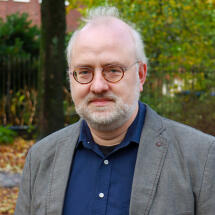Vita
Jan-Hendryk de Boer is a specialist in medieval history. He studied History and German Philology at the University of Göttingen and earned his doctorate in 2014 with a thesis on Johannes Reuchlin and the genealogy of hegemonic humanism. Since 2015, he has held various positions at the University of Duisburg-Essen, submitting his habilitation thesis on the legitimation strategies of the Avignon papacy in 2024. His research focuses on the history of universities and intellectual history, the history of the papacy, and the theory of history.
Research Project
Intellectual and legal constellations in academic conflicts in the High and Late Middle Ages
The research project examines the connection between the legal and conceptual dimensions of significant academic disputes from the 12th to the early 16th century. People of widely varying legal statuses participated in academic debates during the Middle Ages. Furthermore, the relationship between universities and their environment was characterised by legal plurality. Whether this affected the nature of the debates, the escalation of conflicts and their resolution remains an open question. Therefore, the question is to what extent conflicts over claims to truth can be explained in their own right, or whether they can only be understood in terms of their social and, in particular, legal foundations.
Selected Publications
Humanistische Universitätskritik. Entwürfe einer alternativen Wissensordnung im spätmittelalterlichen Europa, in: Hesse, Christian (Hrsg.): Antiakademismus und Wissenschaftskritik vom Mittelalter bis zur Gegenwart. Basel 2025, 83-124.
Die Mediävistik und ihre Gegenwart. Ein Versuch über Mittelalterforschung nach der Moderne, in: de Boer, Jan-Hendryk, Marcel Bubert, Katharina Ulrike Mersch (Hrsg.): Die Mediävistik und ihr Mittelalter. Berlin/New York 2024, 429-471.
Spielarten von consensus in Papstbriefen des 13. und 14. Jahrhunderts, in: Speer, Andreas, Thomas Jeschke (Hrsg.): Consensus. (Miscellanea Mediaevalia 43.) Berlin/Boston 2024, 529-559.
Verus pater ecclesiae. Zur kommunikativen Funktion von Herrschaftsmetaphern in päpstlichen Briefen des 13. und 14. Jahrhunderts, in: Historisches Jahrbuch 140 (2020), 129-181.
Die Gelehrtenwelt ordnen. Zur Genese des hegemonialen Humanismus. (Spätmittelalter, Humanismus, Reformation 101.) Tübingen 2017.
Unerwartete Absichten – Genealogie des Reuchlinkonflikts. (Spätmittelalter, Humanismus, Reformation 94.) Tübingen 2016.


